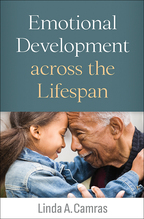Emotional Development across the Lifespan
Linda A. Camras
HardcoverPaperbacke-bookprint + e-book
Hardcover
orderJuly 12, 2022
ISBN 9781462549771
Price: $81.00 392 Pages
Size: 6" x 9"
Paperback
orderJuly 12, 2022
ISBN 9781462549764
Price: $54.00392 Pages
Size: 6" x 9"
Unique in its dual focus on emotion and lifespan development, this text weaves together theory, research, and practical clinical implications for fostering children's emotional well-being. The author examines how emotions are experienced, expressed, understood, and regulated from infancy through later adulthood, surveying both typical and atypical development. For each stage, chapters highlight the interrelated influences of temperament, neurobiology, and the social environment, and distinguish universal processes from those that vary across cultures. The book presents current knowledge about specific emotions, probes the causes and consequences of emotional maladjustment, and reviews evidence-based and promising interventions. Innovative methods, examples, and meta-analyses are described; key terms are defined within chapters and in an end-of-book glossary.
“There is no other book like this on the market. It goes deeper into the emergence of human emotion than general textbooks, avoiding superficiality while remaining accessible. The book is full of compelling ideas about an array of carefully selected topics, allowing readers to benefit from the author’s keen judgment and many decades of research. I admire the way Camras shows students what is changing as emotions develop across the lifespan, while also including some topical themes to help students synthesize material. Distinctive in its breadth and depth, this state-of-the-science text integrates multiple perspectives on emotion, treating different approaches, theories, and methods in an evenhanded and engaging way.”
—Seth Pollak, PhD, College of Letters and Science Distinguished Professor of Psychology, University of Wisconsin–Madison
“The book fills an important gap in the literature—a large body of research and theoretical models are reviewed, underscoring the complexities of universal features and individual differences in emotion across age, family and social context, and culture. I am not aware of any other book that begins in infancy and ends in old age while also addressing the multiple biological, social, and cultural influences on emotion expression, emotion knowledge, and emotion regulation. The discussion of both historical and current views of emotion and the organization of chapters around recurrent themes provides a framework for organizing disparate conceptual models and empirical studies. This comprehensive volume will be relevant to faculty and graduate students in developmental, lifespan, and clinical psychology.”
—Susan B. Campbell, PhD, Department of Psychology (Emerita), University of Pittsburgh
“This book would be great for a graduate or upper-level undergraduate course on emotional or socioemotional development. The coverage is wide and deep, and the reader gains an excellent understanding of the current state of the field.”
—Stuart I. Hammond, PhD, School of Psychology, University of Ottawa, Canada
“This book balances the classic studies and theories of emotional development with current research findings, methods, and applications. You can tell from the strong coverage of such a range of material that the author really knows this field. I would recommend this book for a senior seminar in lifespan or child emotional development. I think students will love it!”
—Ashley Maynard, PhD, Department of Psychology, University of Hawaii
Table of Contents
1. Theories of Emotion and Emotional Development
2. Infancy: The First 2 Years
3. Childhood: 2-9 Years
4. Adolescence: 10–17 Years
5. Adulthood: 18–65 Years
6. Later Adulthood: 65+ Years
7. Some Specific Emotions
8. Adversity, Adaptation, Problems, and Interventions
9. Some Final Considerations
Glossary
References
Index
